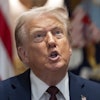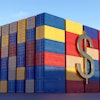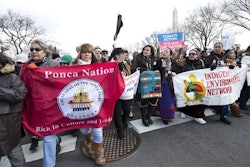The U.S. economy grew at a solid 3.9 percent annual rate in the July-September period, even faster than first reported, giving the country its strongest six months of growth in more than a decade.
The third quarter growth rate climbed from an initial estimate of 3.5 percent because of greater spending by consumers and businesses, the Commerce Department reported Tuesday. The figure followed a 4.6 percent surge in the spring, which resulted in the biggest consecutive quarters of growth since 2003.
Analysts believe momentum could slow to around 2.5 percent in the current quarter but then accelerate again in 2015. They expect growth of around 3 percent, representing a sustained acceleration in activity six years after the Great Recession.
"The question of whether the economy is accelerating or will accelerate is no longer a question; we can say somewhat definitively that the economy has already accelerated," said Dan Greenhaus, chief strategist at BTIG.
The economy as measured by the gross domestic product — the country's total output of goods and services — has been on a roller coaster this year. It started with a steep slide in activity in the first three months of the year when GDP contracted at a 2.1 percent rate, largely due to a severe winter.
Consumer spending, which accounts for 70 percent of economic activity, grew at a 2.2 percent rate in the third quarter. The figure was an improvement from an initial estimate of 1.8 percent growth. Business investment in equipment shot up at a 10.7 percent rate, an increase from an initial estimate of 7.2 percent.
Since the recession ended in June 2009, growth has averaged at subpar rates just above 2 percent. This lackluster recovery has been blamed on the financial crisis and the severity of the recession. Such types of downturns are usually harder to recover from because it requires repairs to the banking system to get credit flowing again.
But economists believe 2015 will be the year when the recovery shifts into a higher gear, in part because they expect the government itself to help. Government spending grew at a 4.2 percent rate in the third quarter, the strongest performance since the spring of 2009. The gain was bolstered by a 16 percent surge in defense spending.
The factors driving that optimism are the same that have dragged on activity this year: government spending and tax policy. By next year, economists believe those policies will begin to pay off and energize growth. Further gains in employment are expected to provide households with more income and boost consumer spending.
The sharp drop in oil prices is also expected to put more money in the pocket of Americans as they spend less at the pump.
To be sure, weakness overseas and another possible recession in Europe may still hamstring U.S. growth. Those concerns rattled financial markets earlier this fall. But stocks have since rebounded to new highs amid signs that central banks in Europe, Japan and China will take action to bolster growth.
The Federal Reserve in October ended purchases of bonds aimed at pushing long-term interest rates down, but language used by the Fed shows that it does not expect to begin raising short-term interest rates for a "considerable time." Many economists believe the Fed's benchmark short-term rate, which has been at a record lows near zero for six years, will not be hiked until the middle of next year.






















